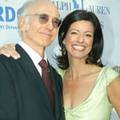|
問:環保觀念對妳造成的影響是不是比對妳丈夫的影響大? 答:我丈夫賴瑞是不小心變成環保人士的,或者應該說他是不情願的吧,因為我不管做什麼事都會拉著他一起。他在他的電視劇裡有個太太的角色,是幫「自然資源防護協會」(NRDC)做事的──我想那就像是他獻給我的小禮物,每當節目中提到NRDC,我那天就會對他超級好。他不需要給我買珠寶或任何東西,只要盡量讓NRDC曝光我就非常開心了。

蘿莉•大衛與她的丈夫。(攝影:Alex Berliner)
問:如果想鼓吹親友一起投入環保事務,妳有什麼樣的建議?
答:立下一套標準程序,然後照著做就好了。
賴瑞被迫接受這種種的環保議題教育,那是因為環保沙龍就在他臥室外頭。事情就是如此,一旦你打開了眼界,一旦你接觸到這些議題,你就很難走回頭路了。像汞污染就是個例子。賴瑞現在知道了汞污染的一切,這下可壞了,每次午餐吃鮪魚三明治,他就會擔心腦部受損的問題。他還為此寫了一個短劇。
問:說一些關於在情境喜劇劇情裡安排NRDC和豐田Prius汽車出場的事情,譬如說,在HBO自製影集「Curb Your
Enthusiasm」裡就出現過Prius。
答:是啊,我讓賴瑞開這台車去工作,並把它放入節目裡。我對那些製作節目的朋友唸個不停,我有個朋友高登(Howard
Gordon)是「24小時反恐任務」的製作人之一,我讓他買了一台Prius並且把它放進節目裡。另外,亞布列罕(J.J.
Abrams)的影集「雙面女間諜」(Alias)裡也有出現這款車。我試著說服人們這是明智之舉,而他們最終都同意用自己的力量來幫助傳播這個消息。
問:對消費者傳遞「我們可以用錢解決環境問題」的訊息,這樣對嗎?
答:問題其實更為複雜。我想我們面對著一個很大的狀況,因為我們是這麼一個消費型的社會。我們這個國家的浪費程度是以天文數字來看的,更別說整個消費心態都認為每樣東西不需要再利用,每個東西都是可以拋棄的,沒有人該為任何事情付責任。
問:你的任務主要是以消費者為導向──要把這個國家的消費能量扭轉到對環保有益的方向?
答:你講的比我想的還要更崇高。我是流行文化的產物,我曾經為大衛•雷特曼的脫口秀節目工作,我處理過喜劇演員的事務,我曾經是一個電視節目製作人,所以我是來自那樣的世界的。對我而言,我嘗試去做的事情之一是把這些事物裡最有賣相的一面挑出來,把它變成一個很簡單又可讓每個人都瞭解的東西。面對它,消費主義就算就算不是唯一,也是這國家的一個重要要素之一。
所以現在也差不多該讓環保運動用上一些市場行銷策略了。環境人士並非都是些吃著糙米飯、保護樹木的人──這樣的刻板印象該結束了,如此才能讓環境議題的訊息傳到社會上每個階層,例如中產階級婦女、工廠勞工、或是任何開車或吃鮪魚的人。
問:當然幽默也是重要的,自怨自艾的態度就非常討人厭,像Grist Magazine的口號就是「佐以幽默的黑暗與悲慘」。
答:那很棒啊。「地球呼叫洛杉磯」這個活動完全就是喜劇、音樂、還有宣傳,賴瑞還表演了鮪魚的獨白。上一次我找來了班•史提勒(Ben
Stiller),這一次我找來了「笑看一週新聞」(The Daily Show)裡頭那些傢伙來做一些搞笑節目。威爾•法瑞(Will
Ferrell)表演了一齣布希想拯救一道彩虹的模仿秀;還有傑克•布萊克(「搖滾教室」男主角)也來軋了一角。
那時候湯姆漢克斯說:「傑克•布萊克是我們第一位來賓,這會兒卻還見不到人影。他很努力在做環保,那我們用全球衛星定位系統來追蹤他為什麼遲到。」而他當然是在加油站給他的悍馬加油,只見加油機上的數字不斷增加,到了450美元左右時卻才加到一半。然後他終於把車開出加油站了,說著:「我快趕不上募款晚會了,我必須離開這裡,我只能加滿一半油。」所以他開車上路,但是到了街上,車子開到半路就沒油了。

蘿莉•大衛與湯姆漢克斯合影。(攝影:Alex Berliner)
問:[笑聲]說到悍馬,妳對於州長(加州州長阿諾)的看法如何呢?
答:嗯,我主要是靜觀其變,因為[阿諾]好像很在意這些問題,而我很景仰他的環保署長塔米能(Terry
Tamminen)。阿諾其實對我在推行的立法工作很支持,這個立法是允許只乘坐一人的油電混合車也能開上共乘車道,好吸引人們去買這種車款。不過話說回來,他自己為什麼不開混合車呢?
問:我聽說妳曾在公路上追在悍馬車旁對著駕駛大聲嚷嚷。
答:我是會和人直接槓上那一型的,不僅會在高處下工夫,我也會在從基層著眼做出行動。你或許會看到我在街角發傳單或是在公路上跟別人嗆聲,但我也會接觸到高層的人,所以我在兩方面都有在努力。我的孩子在後座看到一台休旅車開過來時他們會說:「媽咪拜託!不要!什麼都不要說!」已經到這種地步了。他們擔心極了。但是我對同儕壓力的效果有信心。看看同儕壓力讓人們不穿皮草或是不吸煙有多大的效果,我們必須讓大家知道這些東西已經不酷了。
問:妳對於凱利(2004年民主黨總統候選人)的看法如何?
答:凱利一直都是環保提倡者。他清楚地瞭解我們對石油的依賴,他有能源計畫,也一直為了燃料節約標準努力了很久。從能源和環保的觀點來看,不會有比他更適合的總統人選。
問:好萊塢有什麼人在環保議題方面令你印象深刻?
答:我想是羅蘭•艾默瑞奇(Roland Emmerich),非他莫屬。他對環保運動的貢獻比任何在他之前的人都還多。
問:你是說「明天過後」的導演嗎?
答:這電影棒極了。我覺得這部電影在將來會是一項標竿。我想以後當全國開始嚴肅討論環境議題,人們回顧過去時,就會這麼看待這部影片。就像當初「The
Day After」(1983年科幻電視電影,講述美國中西部小鎮遭核彈襲擊後的種種)上演後引發的凍結核武運動,以及「絲克伍事件」(Silkwood,梅麗史翠普主演,講述一名女性遭逢輻射意外後挺身而出的故事)以及「永不妥協」等等出自好萊塢的影片,這些電影都對全美輿論有重大影響,而「明天過後」的地位就和這些影片一樣。
問:可是有些氣候科學家說這部電影扭曲了……
答:總之是一大串長篇大論啦。但我也要指出,這部大片描寫到這個題材,會有數以百萬計的人們看到,讓「全球暖化」這個龐大又矇懂的概念變得有感情、有人性在裡面。以我的觀點來看,正中目標!
電影也引發了許多真正有意義的事情,像大眾媒體的回應就讓人感到不可思議。時代雜誌說,「電影是科幻的,但是全球暖化卻是真的。」這顯示電影的確使人們開始思考。還有像全美最權威的氣象頻道「Weather
Channel」,也聘請了一位全職的暖化議題專家,這也是電影的關係。他們公開宣稱全球暖化問題是確實存在的。
問:妳是樂觀主義者嗎?
答:讓我反問你:你是樂觀主義者嗎?
問:當然是。
答:我沒看過有哪個環保人士是不樂觀的。當我發現這點之後,我變的充滿希望。我認識的每個人都很樂觀,即便是一群為核子問題奮戰20年的人也一樣。事實就是我們可以解決很多這類的問題,人類所製造的問題也可以靠人類自己來解決。這是個好消息。
問:但是我們總讓人覺得我們很悲觀。
答:是啊,但那是一個迷思。如果我們不樂觀,那我們怎麼能一直奮鬥下去呢?我們就只能放棄了。
【文章連載】
■好萊塢的綠十字軍:電視製作人蘿莉•大衛(上) (下) |
Q: Has environmentalism hit home more with you than with your
husband? A: Larry is an accidental
environmentalist, or I should call him a reluctant environmentalist. I
drag him into everything I do. He made the wife on his show work for the
NRDC. That was like a little gift he gave me, and every time the NRDC is
mentioned on the show I am super nice to him for that whole day. He
doesn't have to buy me jewelry or anything. Just mention the NRDC as
much as possible and I'm happy as can be.

Larry and Laurie. (Photo: Alex Berliner)
Q: What advice do you have for people who are trying to convert
their friends and family to the environmental cause?
A: Set an example -- practice it
yourself.
Larry is forced to be educated on all of these issues because the
eco-salons are right outside his bedroom door. And you know, the truth
is that once your eyes are opened, once you get educated on this stuff,
it's really hard to go backward. Mercury is a great example. Larry knows
all about mercury now, and it's ruined his life because he can't order
tuna-fish sandwiches for lunch anymore without fear of brain damage. He
wrote a skit about it.
Q: Tell me about your efforts to get brands like NRDC and Toyota
Prius placed within sitcoms. You got a Prius on Curb Your Enthusiasm,
for instance.
A: Yeah, I got Larry to drive it and he
put it on his show. I nag my friends who produce shows. My friend Howard
Gordon is one of the producers on 24 and I got him to buy a Prius and
put it on the show. J.J. Abrams put it on Alias. I try to convince
people that this is smart and they ultimately agree and use their power
to help spread the word.
Q: Is it wrong to send the message to consumers that we can buy
our way out of environmental problems?
A: It's more complicated than that. I think
that we have a tremendous job ahead of us on that front because we're
such a consuming public. Our waste levels in this country are
astronomical, not to mention the whole consumer attitude that things
shouldn't be reused, everything's disposable, nobody is responsible for
anything.
Q: Is your mission mostly consumer-oriented -- to turn the tidal
wave of consumer energy in this country in the direction of
environmental good?
A: You've described it much loftier than
I've thought about it. I'm a product of popular culture. I used to work
for the David Letterman show, I used to manage comedians, I was a TV
producer, so I come out of that world. For me, one of the things I try
to do is to take the wonk out of all of this, bring it down to a very
simple thing that everybody can relate to. And face it, consumerism is a
-- if not the -- common denominator in this country.
So it's about time the environmental movement gets some marketing
savvy. The old image of the environmentalist as this granola-eating tree
hugger is over. It has to be over for the message to reach soccer moms
and factory workers and anyone who drives a car or eats tuna.
Q: Humor, of course, is also key. The woe-is-me stuff can be a
major turnoff, which is why the Grist slogan is "Gloom and doom with a
sense of humor."
A: That's great. The "Earth to L.A."
event is all comedy, music, and message. Larry performed his tuna
monologue at this thing. Last time I had Ben Stiller, this time I had
the guys from The Daily Show do some funny pieces. Will Ferrell did an
impersonation of George Bush trying to save a rainbow. Jack Black shot a
piece for me.
Hanks says, "Jack Black is our first guest but he's not here yet.
He's devoted to the environment, let's see on the GPS system why he's
late." And of course he's at a gas station filling up his Hummer. The
numbers are spinning and it's up to like $450 and it's half full. He
finally drives out of the gas station, saying, "I'm late for this
fundraiser, I've got to get out of here, I'll have to leave with it half
full." So he drives out, he's going up the street, and the car runs out
of gas halfway up the block.

Hanging with Tom Hanks. (Photo: Alex Berliner)
Q: [Laughter.] Speaking of Hummers, what are your thoughts about
the Governator?
A: Well, I'm in a major wait-and-see
mode, because [Arnold Schwarzenegger] seems to care about these issues,
and I adore Terry Tamminen, who is his EPA chief. The governor has
actually been supportive of this legislation that I'm working on to
allow single-occupant hybrid cars in the carpool lane as an incentive
for people to buy them. That said, why isn't he driving a hybrid car?
Q: I've heard that you pull up alongside Hummer drivers on the
highway and yell at them.
A: I'm very confrontational. I work at
the grass-tops but I also work at the grass-roots. You might see me on
the corner leafleting and yelling at people on the highway, but I also
have access to high-level people, so I work from both sides. It's gotten
to the point where my kids in the back seat of my car see an SUV coming
and they say, "Mommy, please! No! Don't say anything!" They're
horrified. But I believe in peer pressure. Look how peer pressure has
worked for people not wearing fur coats or smoking. We have to spread
the message that it isn't cool anymore.
Q: What are your thoughts about John Kerry?
A: John Kerry has been a great
environmentalist for a really long time. He clearly understands this
dependence on oil, he has an energy plan, and he's been working and
fighting for fuel-economy standards for a long time. On energy and the
environment, there could not be a better candidate.
Q: Who are the people in Hollywood that you've really been
impressed with on these issues?
A: Roland Emmerich really gets it. He
just did more for this movement than anybody who's come before him.
Q: The director of The Day After Tomorrow?
A: It's fantastic. I think it's going to be
a tipping point. I think people are going to look back [and point to it
as] when the national discussion got serious on this issue. They're
going to point to this movie the way they pointed to The Day After for
the nuclear-freeze movement and Silkwood and Erin Brockovich and all
these other movies that have come out of Hollywood and had a major
impact on the national discourse.
Q: What about the climate scientists who say it distor-
A: Blah, blah, blah, blah. Meanwhile, a
major motion picture got made on this topic and millions and millions of
people are going to see it. It makes this big, confusing concept --
global warming -- emotional and human. As far as I'm concerned, slam
dunk.
And real things have already happened as a result of this movie, like
the incredible media response. When Time magazine says, "the movie is
science fiction, but global warming is real," it gets people thinking.
And the Weather Channel, the most trusted weather authority in America,
has hired a full-time warming expert to work for the channel because of
this film. They've declared the problem real.
Q: Are you an optimist?
A: Let me turn that question around: Are
you an optimist?
Q: Absolutely.
A: I don't know a single
environmentalist that is not an optimist. When I realized that, that
made me very hopeful. Everyone I know -- even people who have been
working on nuclear issues for 20 years -- they're optimists. The truth
is we can solve a lot of these problems. These are all man-made problems
and they can be man-solved. That's the good news.
Q: But we have a reputation for being so gloomy.
A: Yeah, but that's a myth. How could we
keep on fighting if we weren't optimistic? We'd just give up. |
